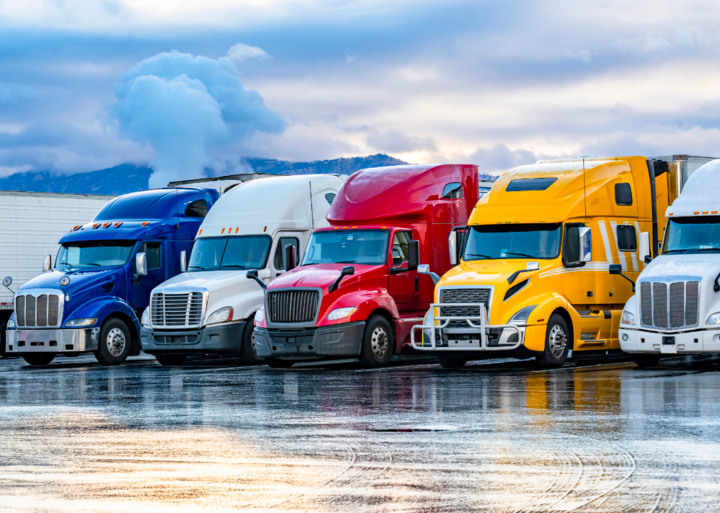
The trucking industry is the backbone of the American economy. It keeps the wheels of commerce thundering along by moving a wide range of goods across the country. The simple truth is that our nation would grind to a halt without trucks.
If you are in the truck parking lot business, you will know that grasping trucking statistics is an important aspect of your thinking. Being fully informed of the various stats available will help you make informed, forward-thinking decisions.
This article will examine the most important, relevant trucking industry statistics, offering a full overview of the current state of trucking and its impact on the economy and, ultimately, your truck parking lot business.
General Trucking Industry Statistics
The numbers behind the trucking industry paint a clear and obvious picture of its scale and significance on the American economy. Here are the broader statistics of the trucking industry:
- Number of Trucks: Over 10.77 million trucks are registered in the United States.
- Economic Contribution: The industry hauls goods worth around $791 billion annually.
- Employment: Approximately 9.2 million people are employed in trucking-related jobs across the country.
- Freight Movement: Trucks transport about 72.5% of the nation’s freight by weight.
- Revenue: In 2021, the industry generated over $875 billion in revenue.
- Small Businesses: Most trucking companies are small, with 95.8% operating ten or fewer trucks.
Importance of the Trucking Industry
The trucking industry is the unsung hero of our daily lives, ensuring that the shelves are stocked, medical supplies are available, and businesses run smoothly. It supports the economy in numerous ways, making it indispensable.
- Supply Chain: Trucks are responsible for transporting essential goods, from food and medical supplies to raw materials.
- Employment: The industry provides jobs for millions, supporting families and communities nationwide.
- Economic Growth: The movement of goods fuels economic activity and growth.
- Connectivity: Trucks connect different parts of the country, making even remote areas accessible.
Income and Employment
The trucking industry offers a wide range of income opportunities, with truck drivers often earning more than the average American worker. Here’s a breakdown:
- Average Salary: Light and delivery service truck drivers earn around $41,960 annually, while heavy and tractor-trailer drivers make about $46,370.
- Full-Time Earnings: Full-time truckers earn $100 more weekly than the average full-time American worker.
- Wages: The average hourly wage for truck drivers in the U.S. is $22.66.
Taxes and Expenses
The trucking industry is a major contributor to state and federal tax revenues, playing a huge role in funding public services and infrastructure. Here are some key figures that demonstrate its financial impact:
- Diesel Tax: As of January 2023, the average state fuel tax for diesel was 32.7 cents per gallon.
- Gasoline Tax: For gasoline, the state fuel tax averaged 31 cents per gallon.
- Federal Tax: The federal tax on diesel fuel was about 24.4 cents per gallon, while gasoline was taxed at 18.4 cents per gallon.
- Highway Use Tax: Trucking companies pay a federal highway use tax, which can range up to $550 per year for vehicles weighing 55,000 pounds or more. This tax supports the maintenance and construction of highways.
- Toll Fees: Trucks often incur significant toll fees, with costs varying by location. For example, a typical toll for a commercial truck on the Pennsylvania Turnpike can be as high as $100 for a full-length trip.
- Registration Fees: Trucks are subject to state and federal registration fees, which can total up to $1,500 annually, depending on the weight of the vehicle and the state of registration. These fees contribute to the administrative costs of managing transportation systems and ensuring road safety.
Challenges in the Trucking Industry
Again, the trucking industry is the backbone of commerce, but it is not without its hurdles. From fluctuating fuel prices to a persistent shortage of drivers, these challenges can greatly impact operations and profitability. Here are some key challenges faced by the trucking industry:
- Fuel Prices: Rising fuel costs are a significant concern, making up 28% of all trucking-related expenses in 2022.
- Driver Shortage: There is a persistent shortage of drivers, with the industry needing 54% of new hires to replace retiring drivers.
- Truck Parking: The truck parking shortage is a pressing issue, ranking as the second-highest concern for truckers in 2023.
- Insurance Costs: Insurance premiums have risen from $12,000 to $14,000 annually between 2019 and 2022.
Regional Statistics
The trucking industry exhibits distinct characteristics across different regions, shaped by unique economic activities and transportation demands. Each region’s infrastructure, regulations, and market conditions contribute to the diverse landscape of trucking operations. Here are some key regional statistics that highlight these variations:
- Top Border Ports: Laredo, TX (USD 20 billion), Detroit, MI (USD 10.7 billion), and Port Huron, MI (USD 6.9 billion) are the busiest truck border ports.
- Freight Value: In North America, freight transported was valued at USD 85.5 billion in 2022, up from USD 73.9 billion in 2021.
- Regional Employment: The Midwest region employs the highest number of truck drivers, with over 900,000 drivers, followed by the South, with approximately 800,000 drivers.
- Infrastructure Investment: The Northeast region invests significantly in road infrastructure, with annual expenditures exceeding USD 15 billion to support heavy truck traffic.
- Goods Transported: The West Coast region leads in transporting agricultural products, accounting for over 60% of the nation’s produce transport.

Owner Operators
Independent drivers often run their own small businesses, facing tough challenges and reaping the rewards of their hard work through generally higher wages. Here are some key statistics and insights about owner-operators in the trucking industry:
- Number of Owner Operators: There are about 400,000 owner-operators in the industry.
- Income: The average median net income for owner-operators is around $70,000.
- Military Background: 34% of owner-operators have served in the military.
- Experience: Many have been driving for over 20 years, with an average age of 46.
Demographics and Diversity
The trucking industry is diverse, with a range of drivers from different backgrounds:
- Gender: 86% of truck drivers are male, while 14% are female.
- Ethnicity: 72% of truckers are white, 12% are black, and 8% are Hispanic or from other ethnic backgrounds.
- Age: The majority of truck drivers fall into the 35-54 age range, with 8% aged 16-24, 17% aged 25-34, 21% aged 35-44, 26% aged 45-54, 21% aged 55-64, and 7% aged 65 and over.
Types of Goods Transported
Trucks are the lifeline of the economy, moving an impressive range of goods that keep various sectors thriving. From everyday essentials to specialized products, the diversity of items transported by trucks hints at their crucial role in maintaining the flow of commerce. Here are some key statistics and insights about the types of goods transported by the trucking industry:
- Top Goods: Clothing, food, furniture, machinery, and electrical goods are among the top transported items.
- Refrigerated Trucks: 90% of food in the U.S. is transported by refrigerated trucks.
- Freight Weight: 72.5% of the freight moved in the U.S. is transported by trucks.
- Agricultural Products: Over 60% of agricultural products, including grains, vegetables, and fruits, are transported by trucks, ensuring fresh produce reaches markets nationwide.
- Medical Supplies: Trucks play a critical role in the healthcare sector, transporting medical supplies and pharmaceuticals, which make up a significant portion of the freight moved.
Costs in the Trucking Industry
Various costs are associated with running a trucking business:
- Driver Wages: Currently account for 32% of all trucking-related costs.
- Fuel Costs: Fuel represents 28% of expenses for typical trucking companies.
- Insurance: Rising truck parking business insurance premiums are a significant expense.
- Miscellaneous Costs: These include mechanical, logistical, maintenance, permits, and tolls.
- Truck and Trailer Payments: Payments for purchasing or leasing trucks and trailers make up about 14% of the total costs.
- Driver Benefits: Health insurance, retirement plans, and other benefits account for roughly 10% of the expenses.
- Repair and Maintenance: Regular maintenance and unexpected repairs can account for a significant portion of the budget, ensuring that trucks remain in good working condition.
- Licensing and Regulatory Fees: Compliance with various state and federal regulations requires payment of licensing and regulatory fees, which can be substantial for trucking companies.
Industry Trends and Forecast
The trucking industry is continuously evolving, with several trends shaping its future:
- Technology: The adoption of trucking technology, such as electronic logging devices (ELDs) and telematics systems, is improving operations and compliance.
- Sustainability: There is a growing shift towards greener practices, including the use of electric and hybrid trucks.
- Automation: Autonomous trucking technologies are being developed for long-haul transportation.
- Driver Safety: Increasing investment in driver training programs and improved working conditions.
Bottom Line
While the trucking and transport industry faces challenges like driver shortages and rising costs, the general outlook remains positive through various innovations and growth in specific areas. With advancements in transport industry technology and a wider focus on sustainability, the future of trucking looks really quite promising.
Either way, whether you’re already operating a parking lot or have unused space, Truck Parking Club can help you maximize your property’s potential. By listing your lot with us, you can provide truckers with reliable parking solutions while generating additional income.
Join our community today and turn your parking space into a valuable resource for the trucking industry.
The information published herein is for general informational purposes only. Truck Parking Club does not make any representations or warranties about the completeness, reliability, legality, and accuracy of this information. Any reliance placed on such material is strictly at the user’s own risk. Truck Parking Club shall not be responsible for any losses or damages incurred in connection with the information published herein.





